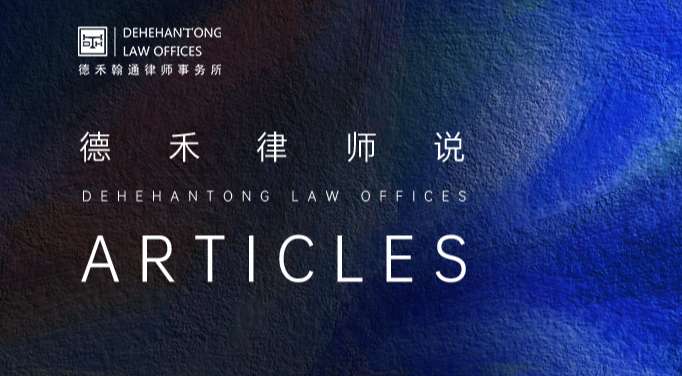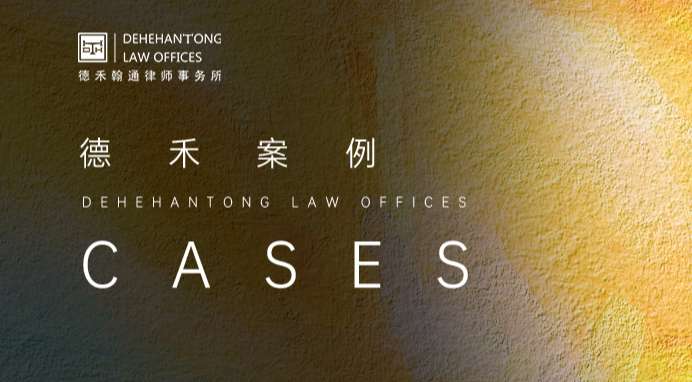From the completion of the shareholding reform of Unitree Technology to the matters of concern in the shareholding reform
Introduction:
On May 28, 2025, Hangzhou Unitree Technology Co., LTD. (hereinafter referred to as "Unitree Technology") completed the change registration from a limited liability company to a joint stock company, which was regarded by the outside world as an important step towards capitalization. As a leading enterprise in the domestic humanoid robot field, the shareholding reform of Unitree Technology has drawn widespread attention from the market.
Generally speaking, shareholding reform is the inevitable path for companies planning to go public to enter the capital market. Not only do the domestic A-share listing rules clearly stipulate that the enterprise type of the issuer must be A joint stock limited company, but companies planning to seek overseas listing through the H-share method also need to go through the shareholding reform process.
This article intends to analyze and summarize from the legal perspective the matters that enterprises should focus on and potential legal risks before the shareholding system reform, with the aim of providing referenceable ideas and experiences for companies planning to go public.
PART.01 Determine the total share capital after share conversion
According to the publicly available business information, the current registered capital of Yushu Technology is 2.594223 million yuan. The amount of registered capital increased by the unconverted shares in this share reform.
Generally speaking, the total share capital after share conversion should be determined by taking into account the company's capital operation strategy and in combination with the standards of the capital market segment to be listed on.
At present, a multi-level capital market has been established in China, including the main boards of Shenzhen and Shanghai, the Growth Enterprise Market, the STAR Market, the Beijing Stock Exchange, the National Equities Exchange and Quotations, and regional equity markets. Each board has different standards for the total share capital of the applying enterprises, setting a benchmark for the total share capital after share conversion.
According to media reports, Wang Xingxing, the founder of Unitree Technology, has not denied the possibility of "listing in Hong Kong" on multiple public occasions. The fact that Unitree Technology did not choose to increase the registered capital amount in this share reform has reserved space for the company to choose other capital markets in the future.
PART.02 Tax Planning
The shareholding reform involves the distribution and conversion of net assets, which is inevitably closely related to taxation. Although the actual shareholding reform plan of 宇树 Technology is unknown, the fact that the company's current change did not increase its registered capital must be the best solution chosen after thorough tax planning.
The essence of shareholding reform is the act of the original shareholders of a limited liability company re-investing their audited net assets to establish a joint stock limited company. Logically, it is divided into two steps. The first step is for the original limited liability company to distribute the net assets after liquidation to all shareholders. The second step is for all the original shareholders to re-invest their distributed net assets in the new joint stock limited company.
Specifically, the distribution involving surplus reserves and undistributed profits is regarded as the liquidation income of shareholders in terms of taxation. For natural person shareholders, a 20% individual income tax is required. However, the share reform is more favorable to corporate shareholders. According to Article 26 of the Enterprise Income Tax Law of the People's Republic of China, Dividends, bonuses and other equity investment income between resident enterprises that meet the conditions are tax-exempt income.
In practice, the individual income tax during the shareholding reform has a more direct and complex impact on natural person shareholders.
On the one hand, although Document No. 116 of the Ministry of Finance and the State Taxation Administration in 2015 stipulates that "starting from January 1, 2016, when small and medium-sized high-tech enterprises across the country increase their share capital to individual shareholders with undistributed profits, surplus reserves, and capital reserves, if individual shareholders have genuine difficulties in paying individual income tax in one lump sum, they may, based on actual circumstances, formulate their own installment tax payment plans. The payment shall be made in installments within no more than five calendar years (inclusive), and the relevant materials shall be filed with the competent tax authority for record. However, the applicable conditions are only limited to small and medium-sized high-tech enterprises, that is, "enterprises registered within the territory of China that are subject to account examination and collection, have been recognized as high-tech enterprises, and have an annual sales volume and total assets of no more than 200 million yuan and no more than 500 employees". Larger enterprises are difficult to enjoy policy benefits.
On the other hand, in practice, tax authorities in various regions have different understandings of the policies, which has exacerbated the complexity of the tax burden issue in shareholding reform. Take the conversion of premium capital reserve into share capital as an example. Among the cases disclosed by listed companies, there are those that have not paid taxes for the conversion of premium capital reserve into share capital, such as Verisilchip (688521), and there are also those that have obtained the filing for the installment payment of individual income tax, such as Rendu Bio (688193). It is by no means appropriate to make a general statement.
Therefore, the actual controller of a company planning to go public should attach importance to tax planning before initiating the shareholding reform and communicate with the local tax authorities in advance to design a shareholding reform plan with a lower tax burden. For start-up companies, it is necessary to plan the equity structure in advance. If a limited company is established as the holding platform at the very beginning of the enterprise's establishment, the tax cost of shareholding reform will be much lower.
PART.03 Clearing the rights of special shareholders
The shareholding reform means that the company has officially embarked on the IPO track. The vast majority of companies planning to go public will go through N rounds of financing before this (with the exception of a few companies, such as Yingshi Network), while Unitree Technology, which has been established for less than 10 years, has already completed its Series C financing. In the investment and financing agreements signed by the company with investors during its previous financing processes, there are more or less some provisions regarding the special shareholder rights of investors. Among them, the provisions involving the company's obligation to repurchase are suggested to be cleared during the share reform. It is not ruled out that investors may request to cooperate in clearing them before the benchmark date for declaration.
On the one hand, in terms of accounting treatment, financing involving the company's repurchase obligations will be treated as liabilities in accounting, which will have an impact on the recognition of the company's net assets before the share reform.
On the other hand, in the practice of IPO review, whether it is an A-share IPO or A Hong Kong IPO, the review and regulatory authorities follow the principle of thoroughly cleaning up the provisions involving the company's repurchase obligation.
Therefore, for companies planning to go public, it is recommended to reach a consensus on the handling plan for the clearance of such special shareholder rights clauses while introducing investors, and make clear agreements to avoid future disputes that may affect the IPO process.
PART.04 Select and appoint suitable candidates for directors, supervisors and senior management
According to public information, the current change of Unitree Technology also involves changes in key personnel. Liang Wangnan (a member of the Investment Decision Committee of Beijing Robot Industry Development Investment Fund (Limited Partnership)) has become a new member of the board of directors of Unitree Technology.
During the process of company shareholding reform, selecting and appointing suitable directors, supervisors and senior management personnel and establishing the corresponding corporate governance structure are also of Paramount importance. Specifically, the selection and appointment of directors, supervisors and senior management should focus on the following aspects:
Possess the qualifications for the position as stipulated by law
Article 178 of the Company Law of the People's Republic of China stipulates that any of the following circumstances shall disqualify a person from serving as a director, supervisor or senior manager of a company:
No capacity for civil conduct or limited capacity for civil conduct;
Where a person has been sentenced to criminal punishment for embezzlement, bribery, misappropriation of property, misappropriation of property or disruption of the socialist market economic order, or has been deprived of political rights due to a crime and the term of execution has not exceeded five years, and has been granted probation, the period has not exceeded two years since the expiration of the probation period.
Where a person has served as a director, factory director or manager of a company or enterprise undergoing bankruptcy liquidation and is personally responsible for the bankruptcy of such company or enterprise, and less than three years have passed since the completion of the bankruptcy liquidation of such company or enterprise;
Those who have served as the legal representative of a company or enterprise whose business license has been revoked or ordered to close down due to illegal activities and bear personal responsibility have not exceeded three years since the date of revocation of the business license or order to close down of such company or enterprise.
An individual was listed as a dishonest person subject to enforcement by the people's court for failing to repay a large amount of debt upon maturity.
Where directors, supervisors or senior management personnel are elected, appointed or hired in violation of the provisions of the preceding paragraph, such election, appointment or hiring shall be invalid.
If directors, supervisors or senior management personnel have any of the circumstances listed in the first paragraph of this article during their tenure, the company shall remove them from their positions.
Among the above situations, the third and fourth ones are often overlooked. Therefore, it is also necessary to conduct certain investigations into the business operations of the candidate's previous employers.
In particular, candidates for independent directors, in addition to meeting the requirement of independence, must also possess certain professional qualities, such as having the basic knowledge of the operation of listed companies, being familiar with relevant laws, regulations and rules, and having more than five years of working experience in law, accounting or economics, etc., which is necessary to perform the duties of independent directors.
For enterprises planning to go public on the Hong Kong Stock Exchange, the selection and appointment of directors, supervisors and senior management also need to meet the requirements of the Hong Kong side.
The Hong Kong Stock Exchange classifies directors into three categories: executive directors, non-executive directors, and independent non-executive directors. The requirements for the qualifications of directors in the "Hong Kong Stock Exchange Composite Main Board Listing Rules" mainly include the following aspects:
At least one independent non-executive director must possess appropriate professional qualifications, or have appropriate accounting or related financial management expertise (such expertise is achieved through experience in working as a practicing accountant or auditor, or as the chief financial officer or chief accounting officer of a public company, or performing similar functions, as well as experience in internal control and the preparation or auditing of comparable financial statements). Or obtained by analyzing the experience of audited financial statements of public companies;
Chinese issuers must have at least one independent non-executive director who usually resides in Hong Kong.
Listed companies must have sufficient management personnel in Hong Kong (at least two executive directors usually reside in Hong Kong) (exemptions can be applied for from the Stock Exchange of Hong Kong).
Furthermore, in the context of overseas listing, there are also diversified requirements for the board of directors. In the practice of Hong Kong ipos, the purpose of board diversity is often achieved by appointing one female director.
2. Independent directors shall not hold more than the number of part-time jobs outside the office as stipulated by law
In China, according to the "Administrative Measures for Independent Directors of Listed Companies", an independent director shall, in principle, serve as an independent director in no more than three domestic listed companies and shall ensure that there is sufficient time and energy to effectively perform the duties of an independent director.
The Hong Kong Stock Exchange requires that if an independent non-executive director serves as a director of six listed companies, the company needs to explain the reasons to demonstrate that the independent non-executive director can devote sufficient time to the issuer.
In practice, it is often the case that some independent directors, in addition to holding positions in listed companies, also hold part-time jobs in multiple enterprises planning to go public. The different listing paces among the enterprises planning to go public have led to flaws in the qualifications of independent directors.
Therefore, before selecting and appointing independent directors, it is also necessary to pay attention to the employment situation of independent directors in the enterprises intended for IPO.
3. The stability and continuity of the positions of directors and senior executives
The review practice of A-share ipos requires that there be no significant adverse changes in the directors and senior management of the companies planning to go public during the reporting period. Generally, explanations need to be provided from three dimensions: the proportion of personnel changes, their positions, and the impact on the company's operations.
The Hong Kong Stock Exchange requires companies planning to go public to determine the candidates for all board members before submitting the A1 application, and it also requires that the management of the companies planning to go public be continuous during the three fiscal years of business records, that is, the majority of the board members (including executive directors) and senior management of the listed companies and their major operating companies have not changed. And it must continue until the applicant goes public.
Therefore, it is suggested that companies planning to go public consider the continuity of the candidates' positions during the reporting period when selecting directors and senior management personnel.
PART.05 Plan the financing plan in advance
After the base date of the shareholding reform and before the joint-stock company completes the industrial and commercial change registration, it is generally not recommended for the company to introduce investors.
If the company urgently needs to replenish working capital due to production and operation requirements and the investor only agrees to enter through capital increase, relevant documents can be signed to lock the transaction during the process of introducing the investor, and the transaction can be closed after the overall change is completed.
If only the transfer of old shares is involved and no change in net assets is involved, it can be considered to confirm the investor's qualification as an initiator in the agreement between the founding meeting and the initiator to avoid the contradiction that the investor has no issuer qualification on the base date of the share reform.
PART.06 Conclusion
Shareholding reform is not only a crucial step for the standardized development of enterprises, but also an important cornerstone for future financing, listing and long-term strategic planning. Unitree Technology has successfully completed the process of shareholding reform, providing us with a valuable reference model. From the design of share capital structure to tax planning, from the optimization of governance mechanisms to financing planning, enterprises must think systematically and make early plans in the process of promoting shareholding reform in order to effectively avoid risks and seize development opportunities. It is hoped that the key points sorted out in this article can provide practical ideas and references for more enterprises that are in the stage of shareholding reform or are about to start shareholding reform.
-
Prev:Interpretation of the Newly revised Anti-Unfair Competition Law and Key Points of Concern in Enterprise Practice
-
Next:Security Requirements for the Identification and Processing of Sensitive Personal Information - Lawyer's Interpretation Based on "Security Requirements for the Processing of Sensitive Personal Information (GB/T 45574-2025)
Recommended Information
-
Case StudiesDehehantong successfully defended himself against a reduced sentence: He changed from issuing false special invoices to illegally purchasing special invoices and was granted probation2025-06-17
-
UpdatesDehehantong has successfully been included in the database of China Xiongan Group Co., LTD2025-06-13
-
UpdatesDehehantong and the School of International Education of Shanghai Business School held a dialogue and exchange activity on practical legal aid between China and foreign countries under the background of the "Belt and Road Initiative"2025-06-12
-
Case StudiesDehehantong successfully defended his case of assisting in information network criminal activities and was not prosecuted on suspicion2025-06-12
-
UpdatesDehehantong donated to establish a teaching award fund for Linshui Middle School in Sichuan Province2025-06-10















